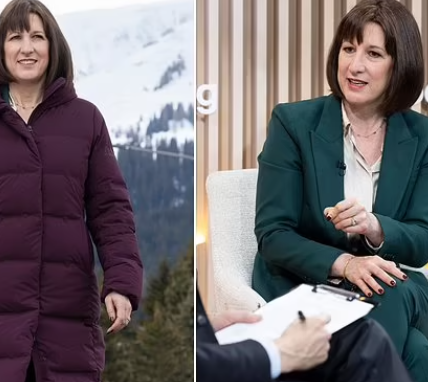Keir Starmer admits UK economy is ‘not good enough’ as GDP ekes out just 0.1% growth in Labour’s first three months… with PM accusing of ‘talking down’ the country and Budget tax hit still to come_Nhy
Keir Starmer admitted the UK’s economic performance is ‘not good enough’ today as figures showed just 0.1 growth in the third quarter.
The PM promised improvement after data covering Labour’s first three months in power came in worse than analysts had expected – with the final month seeing a 0.1 per cent fall in GDP.
The slowdown comes even before the impact of Rachel Reeves‘ huge Budget tax raid is felt. The Chancellor admitted this morning that she is ‘not satisfied’ with the way the economy is going.
However, critics accused Sir Keir and Ms Reeves of spending the election campaign and their honeymoon phase in government ‘talking down’ UK plc, suggesting it was a self-fulfilling prophecy.
The latest quarter was markedly below the 0.5 per cent growth seen between April and June. Economists had pencilled in 0.2 per cent expansion.
The figures also underlined how high immigration has been flattering the headline growth rate. GDP per head – a measure of Brits’ wealth – has remained flat over the past year, and fell by 0.1 per cent in the third quarter.
Liz McKeown, ONS director of economic statistics, said: ‘The economy grew a little in the latest quarter overall as the recent slowdown in growth continued.
‘Retail and new construction work both performed well, partially offset by falls in telecommunications and wholesale. Generally, growth was subdued across most industries in the latest quarter.

Keir Starmer admitted the UK’s economic performance is ‘not good enough’ today as he visited Wales after figures showed just 0.1 growth in the third quarter

A fall in production sparked the dip in GDP seen in September

The UK performance in the three months to September was worse than analysts had expected – with the final month seeing a 0.1 per cent fall in GDP
‘In September the economy shrank a little. Services showed no growth with a notable increase in car sales offset by a slow month for IT companies.
‘Production fell overall, driven by manufacturing, though there was an increase in oil and gas extraction.’
Ms Reeves said: ‘Improving economic growth is at the heart of everything I am seeking to achieve, which is why I am not satisfied with these numbers.
‘At my Budget, I took the difficult choices to fix the foundations and stabilise our public finances.
‘Now we are going to deliver growth through investment and reform to create more jobs and more money in people’s pockets, get the NHS back on its feet, rebuild Britain and secure our borders in a decade of national renewal.’
On a visit to a factory in Wales this afternoon, Sir Keir said the growth numbers ‘were not good enough, not satisfactory’.
He said part of the problem was that Britain had changed PMs and Chancellors too often.
‘The most important thing is economic stability because that’s what’s going to encourage investors to put their money into the UK,’ he said.
Ben Jones, lead economist at the Confederation of British Industry, said uncertainty in the run-up to the autumn Budget ‘probably played a big part’, after firms reported a slowdown in making spending decisions.
‘Hopefully this will prove to be a blip. We still expect the economy to return to a path of modest growth in the year ahead. But downside risks to the outlook have increased.’
Suren Thiru, Economics Director at the ICAEW, said: ‘These figures suggest that the economy went off the boil even before the Budget, as weaker business and consumer confidence helped weaken output across the third quarter, particularly in September.

Chancellor Rachel Reeves admitted this morning that she is ‘not satisfied’ with the way the economy is going
‘Following a ‘gangbusters’ first half of the year, the third quarter outturn paints a more realistic picture of the UK’s underlying growth trajectory given longstanding challenges over poor productivity and persistent supply side constraints.
‘Economic growth in the final quarter of this year is likely to be similarly modest with looming tax rises and growing global uncertainty likely to spark a renewed restraint to spend and invest, despite lower interest rates.
‘In spite of these downbeat figures, a December policy loosening looks improbable as rate setters will likely be concerned enough over inflation risks from the budget and growing global headwinds to resist signing off back-to-back interest rate cuts.’
Shadow chancellor Mel Stride said the Government was ‘reaping, to a degree, what they’ve done’ and have followed up with a Budget that has ramped up taxes ‘that are going to bear down on growth’.
It was put to Mr Stride on Times Radio that he could not blame Labour for the figures given the party only came to power on July 5, to which he replied: ‘No, I’m afraid I have to disagree with this.
‘Across that quarter, across the summer, what the Labour Government did in order to justify what they planned to do all along, which was to substantially hike taxes… it was their mission to talk down the UK economy.’
He added: ‘I’m afraid they’re reaping to a degree what they’ve done in terms of talking the economy down. And of course now what they’ve done is follow it up with a budget that has indeed ramped up taxes, particularly taxes that are going to bear down on growth.’


